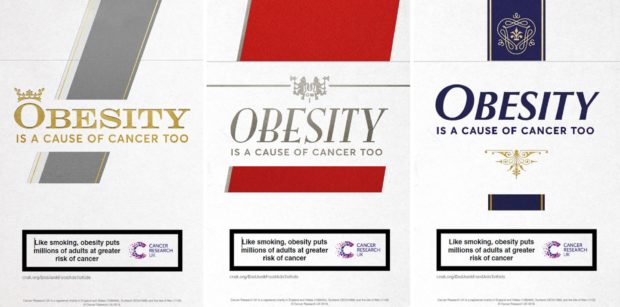Obesity kills more people than smoking for certain types of cancer.
This stark statistic from Cancer Research UK hit the headlines last week but the accompanying adverts, designed to look like the health warnings on cigarette packets, caused a stir. The ‘Obesity Kills’ message was branded as yet another example of fat shaming. Some nutritionists warned that it blamed individuals for a complex situation, meanwhile, on social media, people of a healthy weight who had been diagnosed with cancer vented their fury.
Genetic research is changing the way we think about obesity. Geneticists have pointed to a strong genetic influence over our weight. Some of us are lucky enough to be born with ‘skinny genes’ and some of us not so lucky. Thousands of years of evolution has programmed the body to store fat in times of plenty in preparation for times of famine. In the past this genetic programming would keep us alive. Now it is killing us.
Whilst our genes affect the likelihood of us becoming obese, does that mean we should not point out that being fat is bad for you? I was sat opposite a plump lady on a train last week who ate an entire packet of cake slices followed by a family sized chocolate bar before 10am. This was followed with a sigh as she turned to her pals and exclaimed, “I can’t believe I’ve just eaten a whole pack of cakes and a chocolate bar for breakfast!” Was it just pure greed? Yes, yet it is a mistake we all make and one I made regularly until I had my diet analysed by nutritionists at the Rowett Institute. They asked me to keep a diary of everything I ate. If a colleague offered me a tiny Malteser, I was to note it down.
When I went into the Rowett for the results, the nutritionist showed me several plates of food. There were three plates of fruit and vegetables, and a plate with five chocolate buttons. The experts explained that I could have ALL the fruit and veg, OR the chocolate buttons. It was exactly the same amount of energy. And this is at the heart of the mistake made by the lady on the train. It is very hard to eat three plates of cucumber, lettuce and strawberries but very easy to eat a family sized pack of chocolate.
The nutritionists then pointed to a slice of chocolate traybake I had recorded in my diary as a morning snack one day. This, they said, was the equivalent of an entire day’s energy allowance. Some of us may burn off fat better than others but we all need to wise up to the choices around us. It is easier than ever to choose fatty, sugary options and, worse still, feed them to our kids.
When my children went to school I was appalled at the amount of sweets and chocolate available in the playground, brought to school as mid-morning playpieces or because it was someone’s birthday. Whilst nuts were strictly banned because of the risk of death for children with nut allergies, the school policy against sugary and fatty snacks was ignored. Nuts were confiscated with military efficiency, but sweets were even handed out by teachers as a reward for good work, or to mark special occasions. All this despite the fact that, as Cancer Research UK has pointed out, obesity might well kill these kids in later life.
How do we change these choices without sending the entire population to the Rowett for a personalised nutritional demonstration? Cancer Research UK tried shock tactics which hit the headlines but weren’t generally welcomed. Geneticists tell us that we have to fight centuries of evolution. Ultimately it comes down to small daily choices: the fruit instead of the chocolate buttons.
I find myself writing this on another train journey. The woman opposite me is tucking into a bag of crisps and a bottle of Coke. She is very slim, curse her genetic good for-tune. I have a bottle of water and a homemade chicken sandwich which, I am told, will keep me fuller for longer. Oh, and a big bag of chocolate covered nuts. The Rowett folk were good….but they can’t work miracles.
Eleanor Bradford is a former BBC Scotland health correspondent and now works for a communications agency

